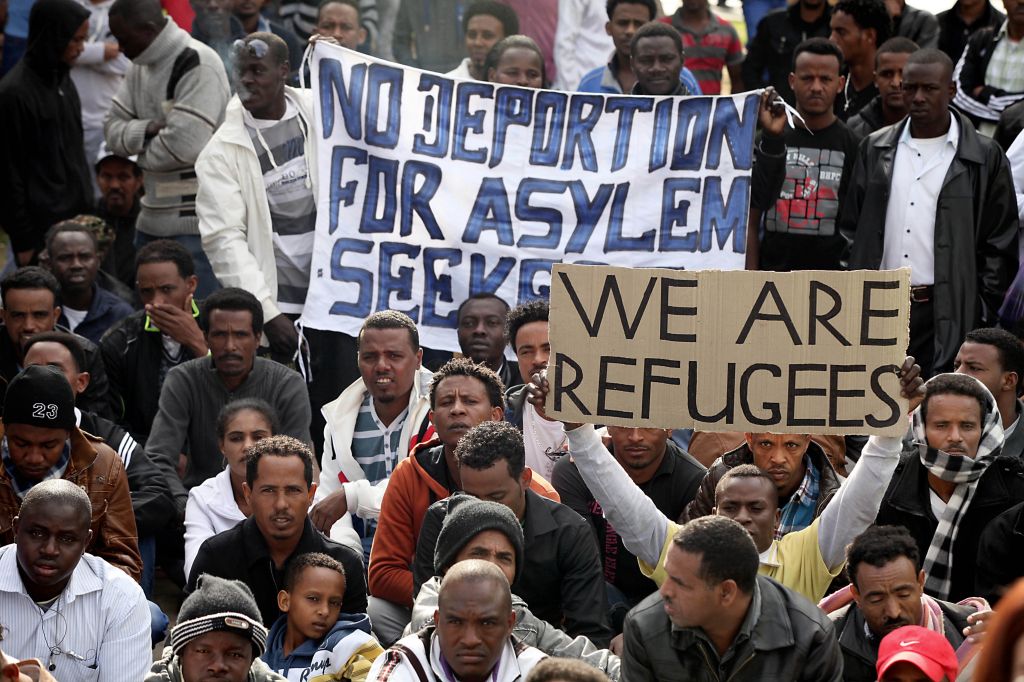There are no products in your shopping cart.
| 0 Items | £0.00 |

T HOUSANDS of Africans living in Israel are opting to be detained in concentration camps rather than leave the country as the April 1 deadline which the Israeli government gave all Africans living in the country to either go or face arrest looms.
HOUSANDS of Africans living in Israel are opting to be detained in concentration camps rather than leave the country as the April 1 deadline which the Israeli government gave all Africans living in the country to either go or face arrest looms.
In what is the most controversial anti-immigration policy ever and reminiscent of what Jews themselves suffered in Germany in the 1930s, the Israeli government has made it clear that it wants to cleanse the country of African migrants. They have been given until April 1 to either leave the country or be arrested and detained in an uncompromising ethnic cleansing policy.
However, as the deadline looms, at a detention centre in Israel’s Negev desert, African migrants facing deportation say they would rather be imprisoned than sent to a country they know nothing about. Many of these migrants, who are being offered to go to Rwanda and Uganda, know very little about the countries they are being asked to leave for.
Abda Ishmael, a 28-year-old Eritrean, is one such migrant, who only knows Israel as his home. Speaking in excellent Hebrew outside Holot, an open facility housing some 1,200 migrants and set to be shut down on April 1 as part of the government’s expulsion policy, he said those who were expelled in the past have tales of woe to tell.
Mr Ishmael said: “I won’t go there. Guys who were here and went to Rwanda and Uganda, we saw what happened to them.”
Israel is looking to expel thousands of Eritreans and Sudanese who entered illegally over the years. As the migrants could face danger or imprisonment if returned to their homelands, Israel is offering to relocate them to an unnamed third country, which aid workers say is Rwanda or Uganda.
Those who choose to leave by the end of March are being offered a cash incentive of $3,500. However, the plan has drawn criticism from the United Nations’ refugee agency as well as some in Israel, including Holocaust survivors who say the country has a special duty to protect migrants.
Eritreans at Holot say Rwanda and Uganda hold no prospects for them and they would rather be imprisoned in Israel than embark on another journey into the unknown. Ishmael, who reached Israel in 2011 after a terrifying journey from Eritrea, has heard about the fates of others sent to Rwanda or Uganda.
He said they have faced hardships in their new homes and gone on to take dangerous routes to Europe in hope of winning refugee status. He vowed he would not voluntarily step back into the unknown.
“We know of people who were killed by the Islamic State group, killed on their way to Libya, who starved and died of thirst in the desert. These people were just seeking asylum,” Mr Ishmael added.
According to interior ministry figures, there are currently some 42,000 African migrants in Israel, half of them children, women or men with families, who are not facing the April deportation deadline. Israeli officials stress that no one they classify as a refugee or asylum seeker will be deported.
However, out of some 15,400 asylum requests filed, 6,600 have been processed and just 11 have received positive answers. Another 1,000 Sudanese from Darfur have received special status preventing their deportation.
Migrants began entering Israel through what was then a porous Egyptian border in 2007 but the border has since been strengthened, all but ending illegal crossings. Many migrants ended up in southern Tel Aviv, where they found work as dishwashers and cooks but their growing community angered some Israelis.